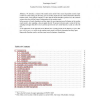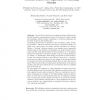38 search results - page 1 / 8 » Random Oracles and Auxiliary Input |
CRYPTO
2007
Springer
13 years 10 months ago
2007
Springer
We introduce a variant of the random oracle model where oracle-dependent auxiliary input is allowed. In this setting, the adversary gets an auxiliary input that can contain informa...
CRYPTO
2011
Springer
12 years 4 months ago
2011
Springer
Deterministic public-key encryption, introduced by Bellare, Boldyreva, and O’Neill (CRYPTO ’07), provides an alternative to randomized public-key encryption in various scenari...
MFCS
2000
Springer
13 years 8 months ago
2000
Springer
Abstract. A binary sequence A = A(0)A(1) . . . is called infinitely often (i.o.) Turing-autoreducible if A is reducible to itself via an oracle Turing machine that never queries it...
PKC
1999
Springer
13 years 8 months ago
1999
Springer
One of the key directions in complexity theory which has also filtered through to cryptographic research, is the effort to classify related but seemingly distinct notions. Separa...
IJCNN
2000
IEEE
13 years 8 months ago
2000
IEEE
We introduce an algorithm for learning a local metric to a continuous input space that measures distances in terms of relevance to the processing task. The relevance is defined a...


